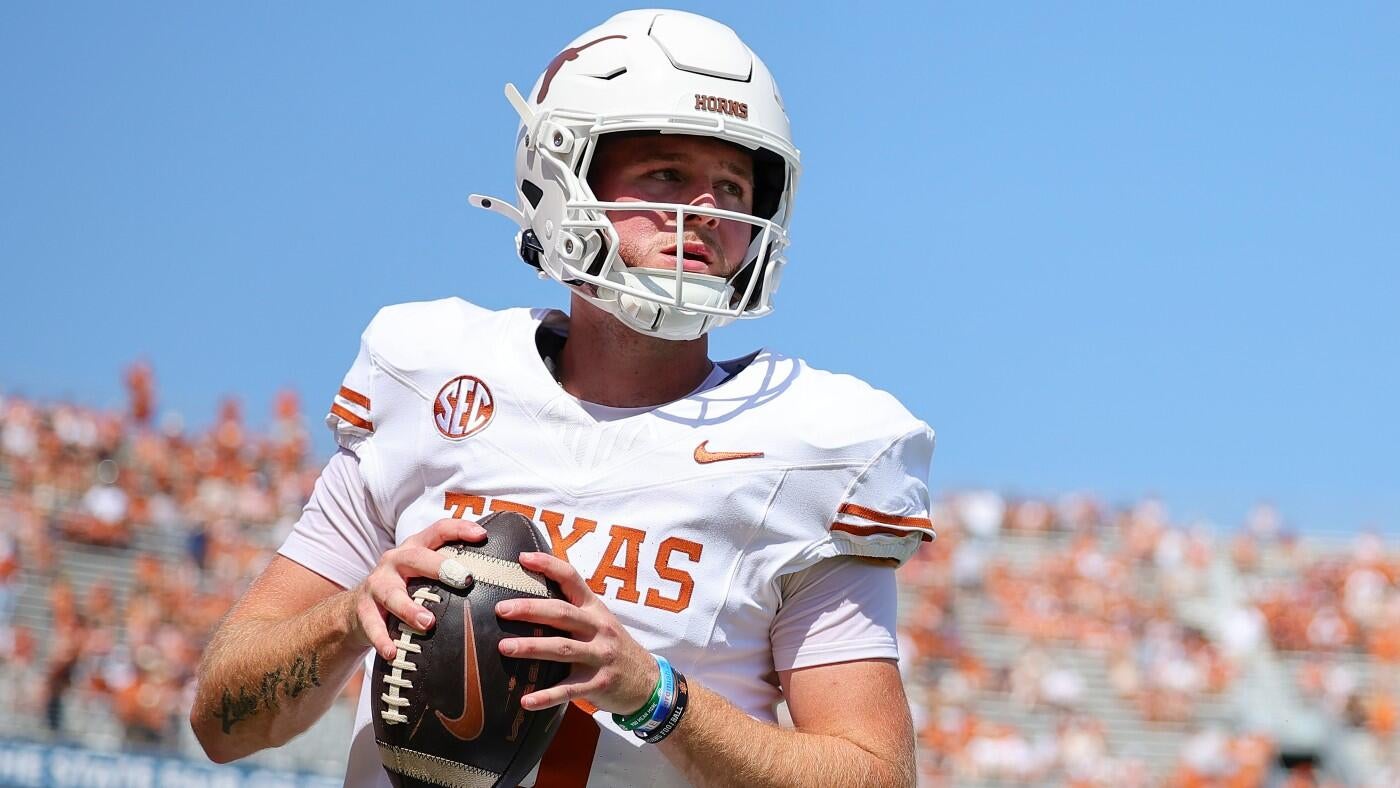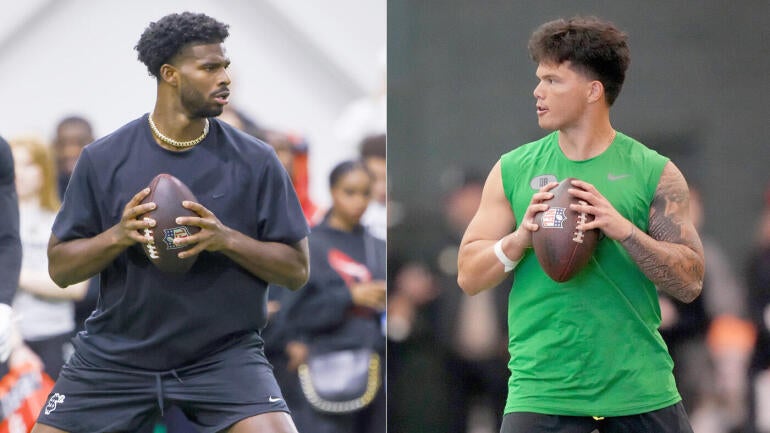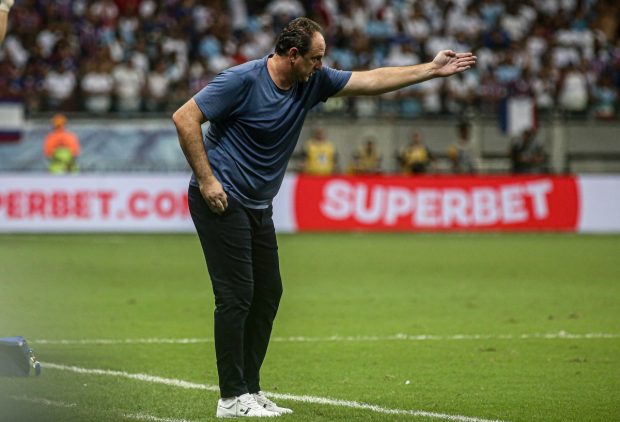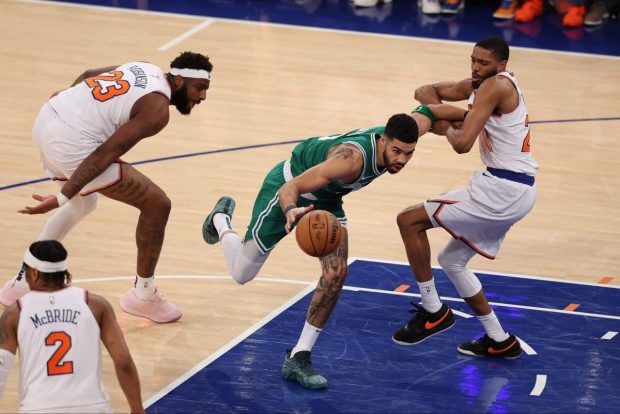

Picks 94 and 144 aren’t traditionally where franchise quarterbacks are found, but those are the two players the Browns‘ faithful has pinned its hopes to. Dillon Gabriel and Shedeur Sanders were both flawed draft prospects in their own ways. Gabriel comes with a major height red flag measuring in at under 5-foot-11 while Sanders has…well…you’ve heard it discussed enough already at this point. That’s how you fall to the third and fifth round, respectively.
That doesn’t mean they’re doomed to be backups, however. Gabriel and Sanders both have unique skillsets that could easily develop into long-term starters at the next level. So what should we expect from both in a quarterback competition? Let’s break it down trait-by-trait:
Arm strength
This one is an easy one to start because for my money it’s not close. Gabriel’s zip is better regardless of the situation or area of the field he’s attacking. I think most are of the opinion that because Gabriel lacks size, he lacks an NFL-caliber arm. I reject that wholesale and would put it firmly in the average range by NFL starter standards. In terms of pure arm strength, I’d put Gabriel in the Jayden Daniels range while Sanders is closer to Jalen Hurts. Just look how easily Gabriel can push the ball on vertical routes:
Advantage: Gabriel
Accuracy
This is a battle between the quarterbacks who finished first (Sanders, 73.4%) and third (Gabriel, 72.3%) in completion percentage last year in college football. While both those numbers are juiced by screen-heavy offenses, Gabriel’s was taken to an extreme. His 7.0 average depth of target was a full half-yard shorter than any other quarterback in college football. You see more open misses on his tape than you do with Sanders, and for that reason I give the slight edge to the former Colorado quarterback.
Advantage: Sanders
Mobility
This is yet another one I’m going to punt on. Gabriel looks like the better straight-line athlete on tape, but Sanders can be harder to pin down in space. Both are mobile enough where their legs can be a weapon, but not so much that it’s a focal point of their game. If you are using them in the run game more than few plays a game to keep the defense honest, it’s likely too much.
Advantage: Tie

Playmaking
This is where Sanders shines. Playmaking is that “know it when you see it” ability to create something out of nothing. It’s what keeps an offense moving when the designed play call doesn’t go as planned. And it’s where Sanders shows off repeatedly on tape.
It’s not that Gabriel is incapable in this regard, but rather that it’s Sanders’ trump card trait.
Advantage: Sanders
Pocket presence
Pocket presence is sort of a catch-all for a few different aspects of playing the quarterback position. It’s a combination of being calm under pressure as well as consistently knowing where to be in the pocket. Sanders is dichotomous in this regard because he’s eerily calm when faced with pressure, but generally a mess when it comes to avoiding the pressure in the first place with pocket movement. Plays like the one below are a common occurrence on his tape:
Sanders may not get a pocket that clean more than once or twice a game at the next level, so the fact that it almost resulted in a sack — and likely would with NFL defensive tackles — is a scary thought. But at the same time, he still had the wherewithal to turn it into a touchdown.
Gabriel may not have as many special plays under pressure as Sanders, but he’s far more consistent with his landmarks and extremely adept at finding escape routes when things get hairy. Gabriel’s pressure-to-sack-conversion ratio was under 14% the past two seasons while Sanders’ was at 22.6%.
Advantage: Gabriel
Decision-making
One of the biggest selling points for both Sanders and Gabriel over the course of their collegiate careers was their ability to protect the football. They finished third (Sanders, 1.3%) and fifth (Gabriel, 1.6%) last season in PFF’s turnover-worthy play metric. That’s nothing new, either, as Sanders had a career 1.7% turnover-worthy play rate while Gabriel was at 1.9%. It’s rare to see either completely misdiagnose a coverage and put a ball into a flat-footed defender’s chest.
Advantage: Tie
Experience
2025 was a unique draft in terms of experience with Sanders and Gabriel both being amongst the most-repped college quarterbacks of all-time. Sanders finished with 2,166 career dropbacks and 40 starts to his name. Gabriel has him beat in both, as he set the FBS record with 63 career starts and 2,347 career dropbacks. Add in the fact that Gabriel was a four-year high school starter, and he’s got the slight edge here.
Advantage: Gabriel
Bottom line
The winner of Cleveland’s quarterback competition is obviously not guaranteed to be either Gabriel or Sanders, but all hope of long-term upside at the position right now comes from these two. While Gabriel has the slight edge in terms of experience and NFL-readiness, Sanders’ out of structure playmaking combined with more prototypical size might present more upside in the future.
This news was originally published on this post .










Be the first to leave a comment